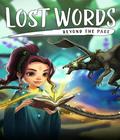While the platform didn't have any big-name exclusives, Google Stadia was home to a few indie titles that premiered on the streaming service. One of those was Lost Words: Beyond The Page, a platforming adventure written by Rihanna Prachett that garnered quite a bit of praise for its story and gameplay. The platform received criticism for not handling the pandemic-induced internet traffic too well. Almost a year later, the title is making its way to a bevy of more traditional platforms, including the PC.
Lost Words features two narratives. The first deals with a young girl named Izzy Cooke, a typical English girl with a typical family. She loves her grandmother immensely and aspires to be a writer. That's helped by her brand-new journal, a gift from her grandmother. Everything is going fine until her grandmother suffers a stroke and Izzy's life is upended.
Sickness, death, and the different stages of denial and acceptance aren't exactly commonplace subjects in video games, but they have been explored before, especially if you're a walking simulator fan. That doesn't make their presence any less special, and most people will see it coming from the opening moments way before the main character experiences it. What makes this different is that all of this is relayed through the viewpoint of a child. She's old enough to know about death, but the process of losing someone so beloved still hurts greatly. The emotional journey feels raw enough that you can't help but experience those same emotions with her. It's engrossing stuff, but the excellent writing seals the deal as Izzy doles out reactions and responses that feel authentic for someone her age, rather than coming off as someone making an attempt to convey childhood emotions about the subject while acting too mature.
The other narrative comes through based on the story that Izzy is composing. In the land of Estoria, there lived a girl named either Robyn, Georgia, or Grace, depending on the name that the player chooses. Returning to her village with a new firefly companion, she meets up with the village guardian, who gives her a magic book and instructs her to meet at the sacred firefly tree so she can take over as the new village guardian. Not even in the role for a day, she awakens to her treetop village under attack. She seeks the help of the fireflies, but they're all gone, and a large dragon is seen flying away from the scene. Without any other leads, she decides to follow the dragon and return the fireflies before everyone in her village fades away from sickness.
The story is meant to parallel what Izzy is experiencing, but it also works well as a stand-alone tale. Everything, from the desert occupied by a disgruntled djinn to a creature composed entirely of fire, coincides with Izzy's predicaments at the time but feels at home in the fantasy setting. Like the writing of Izzy in her journal, the story in this section feels good because it also feels like age-appropriate writing by a gifted child. It works, especially as a way to get the player invested in the tale and ready to accept a predictable yet bittersweet ending.
The gameplay is a little different depending on which story you're working with. In the journal, you walk or jump on highlighted words to create new sentences to continue the story; platforms either take you to a new line or to the next journal page. In some cases, you encounter slips of paper with words on them that can be placed in the appropriate blank spot to create a sentence or used as a platform to reach higher spots. A few of the words make images appear, some of which are interactive, such as a scene where you move things to their correct spots to make tea for your mother. Spread throughout the pages are little asterisks that trigger more phrases to appear; some shape the tone of the story or add personal importance to some tidbits.
In Estoria, the game focuses on the use of word magic. Whenever you reach an area that can't be traversed with normal jumps or by crawling through tight spaces, you can use your book to conjure up words that act as actions for the world's hotspots. Some of the words are only available temporarily, such as when the word "hope" is only around long enough for you to get through a dark cave system. Other words like "break," "repair," and "rise" are a permanent part of your arsenal; they help you make objects usable or act as actions to stop barriers from affecting you. Aside from these platforming puzzles, you can also use the words to uncover spots that hide some of the fireflies that you've tasked yourself with collecting.
The varying gameplay can feel inventive but not exactly challenging. When in the journal, it's easy to figure out what to do, and experimentation is encouraged since every answer is acceptable and nothing is ever presented like a puzzle. Even though there's lots of platforming, missing jumps and falling to the bottom of the screen simply resets you to the beginning with no penalties. The same thing happens when you're in the story, as there are no hazards to avoid and no enemies attacking you. The puzzles start to get complex in the later stages of the game, but even then, they aren't considered too daunting or insurmountable. As such, players won't find this to be challenging, but that's to be expected for a game with a major narrative focus.
Titles with a narrative focus usually don't give players too many reasons to replay them, but Lost Words puts in the effort to coax people into coming back. There are several moments when you're asked to make narrative choices, and while they don't completely change the story, they open up different avenues that tweak the tone just enough to make it feel a little different. For those who like collecting things, every level after the opening sequence provides the opportunity to collect the fireflies that were scattered when your village was attacked. Unlike the narrative choices, these have some impact on the ending, as you'll need them all to fill in the details of the game's conclusion.
The presentation is absolutely stellar. The world of the journal may initially be in black and white, but the watercolor images make the scenarios look gorgeous, even in the unhappiest of times. Meanwhile, the story world solidifies the watercolor look even more, making it fall in line with some of the more artsy 2D platformers. In both cases, the animation is fluid, and the effects and lighting make things look picturesque. The audio is another high point in the game, with the music shifting nicely between the sad and melancholy to the adventurous without creating something that sounds too different. The voice acting is also brilliant, with special attention paid to Izzy's voice actor, who did a terrific job at conveying the right amount of emotion in every scene. There are times when the balance between the music and voices isn't done right, causing some of the dialogue to get drowned out by the score. If it weren't for the constant subtitles in play, this would've been a much bigger issue.
Like a good number of story-based indie platformers before it, Lost Words: Beyond The Page has the potential to stick with you long after you reach the end credits. The game looks and sounds wonderful, and the gameplay feels novel, even if it isn't challenging. It is the story that you will remember the most, especially since the different perspective gives the tale even more of an emotional impact. For those who crave story, Lost Words is well worth checking out.
Score: 8.0/10
More articles about Lost Words: Beyond the Page











 Lost Words: Beyond the Page is atmospheric puzzler, set between the pages of a diary and a fantasy land, with a story written by Rhianna Pratchett.
Lost Words: Beyond the Page is atmospheric puzzler, set between the pages of a diary and a fantasy land, with a story written by Rhianna Pratchett.




















